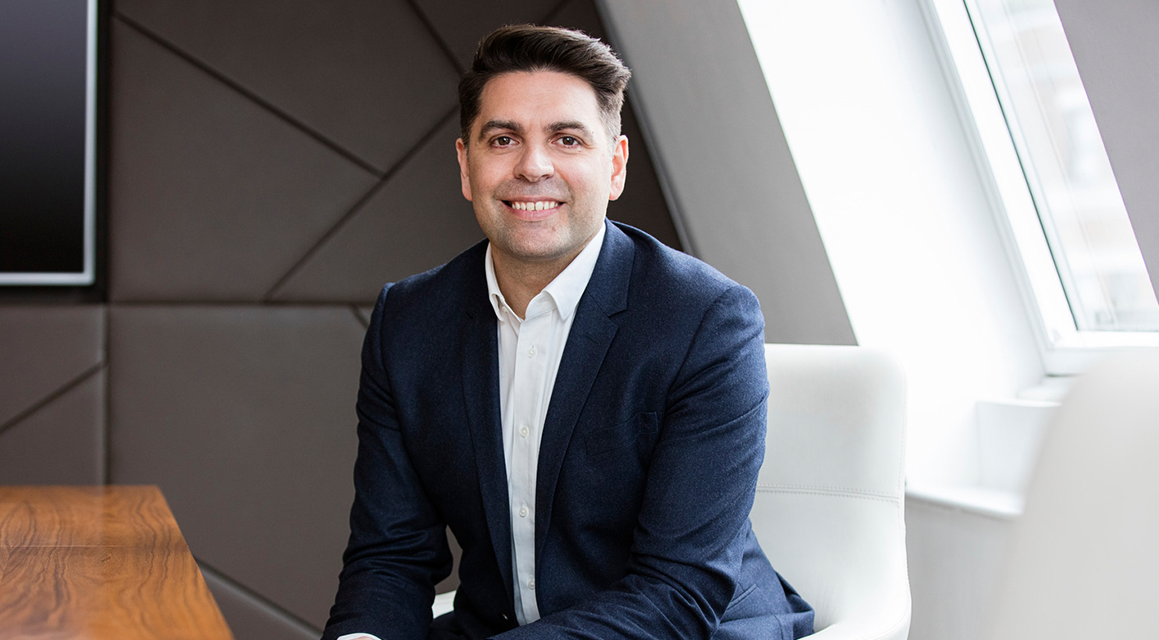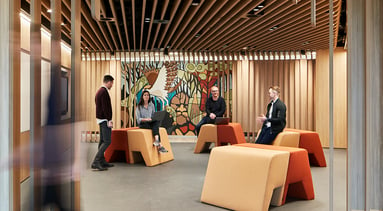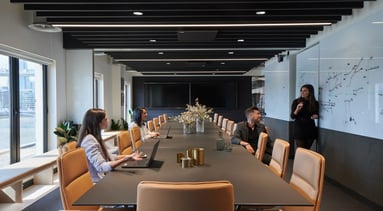
We talked to Lawrence Mohiuddine, Unispace’s Managing Director for North America and EMEA, about the different ways the pandemic has affected his regions and what advice he would offer clients right now.
Over the past six months, Unispace has walked alongside our clients on an extraordinary journey. We’ve helped them navigate lockdown, arrange a safe return to work, and plan for how they will use their offices in future. Here, we focus on the experience to date in North America and EMEA.
Unispace is a workplace business – and the Coronavirus has massively affected the workplace. What has this meant for you?
We’ve always seen ourselves as being here to provide the very best service for our clients – so that hasn’t changed. We’re still doing exactly that, it’s just that the challenges have been much more extreme with Covid-19. This means our expert guidance is needed more than ever.
Our clients aren’t just businesses, they’re people. They’re the executives we’ve known for years, in many cases. They work in workplace experience or real estate within big multinationals and they’re under huge pressure to come up with answers to what this all means for the future workplace.
There are so many questions they’re asking themselves:
- How many employees will come back to the office, and when?
- What should their offices look like, and how will they function?
- How will they welcome clients in future?
- Where should their offices be?
- Should they reduce their footprint?
No one knows exactly what the future holds, so we gather all the evidence we can and provide our very best advice.
In the two regions I’m responsible for, some countries went into lockdown very quickly while others stayed open. In the USA, the pandemic came later than in EMEA and its effects have been much deeper, and reopening has been on a city-by-city basis. Having supported our EMEA clients first, we were able to apply all our learnings to North America, which helped make the return to the office faster and smoother. And we're able to adapt and be nimble as second waves hit the regions.
When the lockdowns hit, I immediately ensured that we provided our clients with practical action plans for getting people working safely and effectively from home. Now, we’re doing the same for getting clients back into the office. For the longer term, we’ve also developed what we see as the most flexible, robust framework for the future office — Propeller — and that’s been very well-received.
So how has Propeller come about?
Our strategy teams interviewed thousands of people globally in the search for what should come next: senior executives, employees, industry analysts and thought leaders. Then they used the findings from all this research to come up with the Propeller framework, blending the best of remote working with the best of the office.
The critical thing is that future workplaces must be so much more flexible than before, so we’ve also developed some pretty sophisticated calculators to help clients input the metrics for their own industry and business. This means that each implementation of Propeller will be unique.
What strategic advice or insights would you offer your clients right now?
1. Don’t rush to shed or shift your footprint.
It’s more than likely you’ll still need most of your space in future, but you’ll use it differently. Not many tenants are making long-term capital-intensive leasing decisions at the moment. Short-term renewals are popular with occupiers – and landlords are glad to have them.
2. The city centre is not dead.
Head offices may look and operate a little differently in future, but businesses will still need headquarters and they’ll still need them right where they are. Unispace is continuing to invest in regions where we’re expecting growth, so we ourselves have opened our new Amsterdam studio in Zuidas, the financial district, and in Zurich we’ll similarly be in the key business district of Kreis 1. We’re also investing in New York and in the San Francisco Bay Area – although that’s not a central business district (CBD) or city centre as such, it’s the focus of the tech industry.
3. People will come back to the office.
Maybe more flexibly, and maybe not every day. But some things can only be done, and some needs can only be met, in the office.
4. Finally the return to the workplace won’t happen overnight.
And the pace will vary depending on the location. For example, it will be down to how badly a city was hit by Covid-19, and what kind of transport people use to get to work. Cities that were harder hit and rely on public transport – such as New York and London – are seeing 1 to 30% occupancy, while Milan and Zurich are experiencing 60 to 70% occupancy right now.
There have been some important new appointments to Unispace’s C-suite. How will that affect you and your regions?
In September, Steven Quick joined us as our new Global CEO, based out of Chicago, and it’ll be his task to take Unispace into a new era of growth. It’s our first time having a CEO based in the USA. That’s really important, because it not only signals our truly global nature but it’s where a lot of multinationals are headquartered.
We’ve also welcomed Michael Casolo as our Chief Revenue Officer. He’ll be based in New York, although he has many years’ experience in the Bay Area. Michael will be responsible for leading our business development teams, making sure we focus on the industries and geographies that most need us and where we see the most potential.
About Lawrence Mohiuddine
Lawrence looks after our operations in the northern hemisphere, which includes key studios in Amsterdam, Boston, New York, Milan, Paris, San Francisco and Zurich. He has over 20 years’ experience leading diverse teams in the delivery of complex office projects. He was Managing Partner at Maris Interiors for 10 years and has also worked at Morgan Lovell. He has run his own consultancy business.
Follow Lawrence on LinkedIn.


